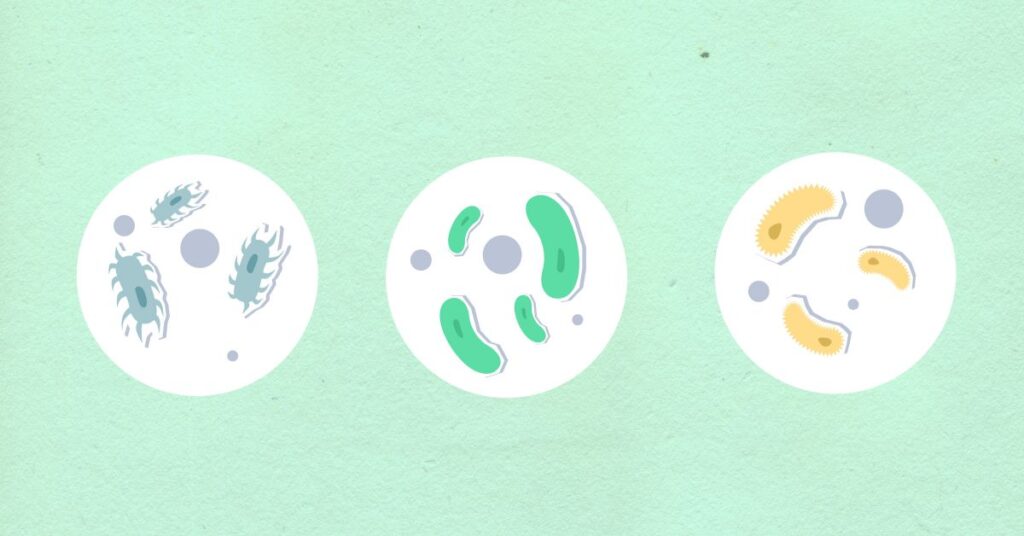If I have hormonal issues and gut issues, where do I start? Do I start with the hormone stuff? Do I start with the gut health stuff? Let me explain all things hormones and gut health.
*This is a modified transcript of an episode from my podcast, The Nourished & Thriving show. This episode is titled “Hormones & Gut Health – What you need to know”, which you can listen to here.
*This is not medical advice.
First things first, I’m a registered dietitian on a mission to help you increase your impact and legacy on the world while healing your gut and reducing your IBS symptoms. My goal is to inspire you to live vibrantly and provide valuable resources and information that empowers you to take bold action towards your health goals.

Understanding Female Hormones
The hormones we are discussing are specific to female hormones, however males need to know this too, because you probably live with or love a woman and you have hormones too. As a woman, it would be a very rare occurrence for you to have never given any thought to your hormones. We talk a lot about PMS or hot flashes with menopause or perimenopause. We (or others) always blame our emotions on our hormones. I can’t tell you how many times my husband has made a comment about my hormones when I was pregnant and not in a great mood. The thing is, even though it is “hormonal”, the feelings that we’re feeling from those hormone changes are very real in the moment.
On the flipside, it’s really cool because our hormones change and adapt through our different life stages. I just want to take a moment and say how remarkable and amazing our bodies are that we can carry life and grow life inside of our bodies, and our bodies adapt to that when we’re healthy and able to. Now I know not everyone wants to or is able to have children, but the woman’s body is really remarkable. I love that this day and age is more about empowering women to know more about their ovulation and about their hormonal cycles. But it leaves a lot of questions out there, because it’s new information to a lot of people or incomplete information or misinformation being circulated by self-designated internet gurus who don’t actually know what they’re talking about. Please don’t get your hormone education all from like TikTok or reels. If you do, make sure your source is somebody you really trust or research what you hear on your own to confirm what you heard.
Hormones and Gut Health
The one question I get asked a lot about within my work as a dietitian is hormones and gut health.
You see, I look at all of my clients as a whole person when we’re first starting out, and as we continue to work together I want to know all the things. So I ask about your lifestyle choices. I ask about past antibiotic use. I ask about everything. And so hormones do come up. Even if you think you’re talking to me about your gut symptoms – like constipation and nausea and diarrhea – we’re also going to be talking about hormones, because they’re related. Moreover, there’s a lot of confusion circulating around what’s normal. What’s not normal. What can you do? What can you not do? What helps? What doesn’t help? All of that, and how it all relates back to gut health. So let’s start here…
“If I have hormonal issues and gut issues, where do I start?”
Do I start with the hormone stuff? Do I start with the gut health stuff? And my answer is typically gut health. And we’re going to talk about why that is, and we’re going to get a little bit science-y, so ready yourself.

First, we’re going to throw a big word out to you: estrobolome. Estrobolome is the collection of bacteria in your gut, right? Your microbiome. So within your microbiome, you have your estrobolome, and this is like a subset group of your microbiome that can specifically impact the circulating estrogen levels in your body. Pretty cool, right? So you can impact the estrogen levels in your body from this subset of bacteria in your gut. So that’s the first thing that should tip you off here. If you have an imbalance of bacteria – or dysbiosis – in your gut, your estrogen can be affected in your body. So that’s something we can determine based on the functional stool test I use for my clients. Because you can actually measure it and there’s quite a lot of research about it.
You have estrogen circulating in your blood, right? But you also have some that re-circulates throughout your body and most of what you don’t need exits your body to keep your body healthy and balanced. So, to recap, your estrogen is circulating in your blood, goes into your liver, gets broken down, then it goes into your gut from there, where it meets with your estrobolome. And the estrobolome specifically impacts estrogen levels by making an enzyme, and this enzyme is what my test tests for. That enzyme is called beta-glucuronidase.
Beta-glucuronidase has a few different functions in the body and in the gut:
- Breaking down carbohydrates
- Nutrient absorption through the gut
- Reabsorbing estrogen and recycling it.
If you have too much of this beta-glucuronidase, then too much estrogen gets recycled and reabsorbed into the body and re-circulated. This leads to what’s called estrogen dominance. Common symptoms of estrogen dominance include:
- Long, heavy periods
- PMS/irritability
- Bloating
- Cramps

Bacteria produce beta-glucuronidase (aka dysbiosis in the gut), and that is what ultimately leads to estrogen dominance. Then we can safely say that a gut imbalance is where this all kind of goes off the wheels. This can work the opposite way too, in that a positive balance of bacteria can lead to a healthy balance of estrogen in the body.
So how do we balance out the bacteria? We actually know the foods that impact estrogen dominance also negatively impact our gut health. This is good news, because there’s so many diets… Endometriosis diet. Gut health diet. Hormone diet. On and on. But really there is no single perfect diet. And of course, we want it to be easy. We want it to be black and white. It’s normally not like that. But with this, it is kind of simple… What works for one (hormones), works for the other (gut helath). So even though there’s no single perfect diet here, by eating foods that promote gut health, you’re also eating foods that promote hormone health and balance. Hence, this is why I start with gut health when looking at hormone issues.
Foods and Diet for Hormones and Gut Health
Whenever we’re thinking about hormone imbalance and gut imbalance, and really most chronic diseases, we’re looking at inflammation.
So we need to avoid inflammatory foods, such as highly processed foods, highly refined carbohydrates, excess sugar, high alcohol, high dairy, high levels of red meat, inflammatory cooking oils, etc. It’s not good for our gut health. It’s not good for our hormone health. Now I’m not going to say you can never eat these foods again, but lets focus on bringing things back into balance, and finding something that works for you that makes you feel really, really good.

As an example, one diet in particular used a lot in research is the Mediterranean Diet. There’s a lot of research supporting it, since it’s eaten a lot within a “blue zone”, which is an area where people tend to live to older ages and are still capable, strong and independent. There was a study looking at the Mediterranean diet and its impact on estrogen dominance, which showed that following a Mediterranean diet for six months reduced estrogen levels by 40%. It probably did a whole lot of other things, too. This diet also possibly led to less brain fog, more energy, better bowel movements, etc. Because whenever you adjust to a healthier diet, you’re going to get other benefits as well.
I don’t think Mediterranean diet is necessarily perfect for everyone, but it’s a really great place to start. It’s a pretty moderate approach to food and to eating, that’s really doable. So I think, you know, if you’re struggling with hormonal imbalance, start with nutrition. You don’t need fancy testing to figure out all the exact things. If you’re able to stick to the plan, and make those habit changes on your own, do that.
I’d like to note that whenever we’re looking at estrogen dominance, we have to consider that it’s linked to other hormones as well, such as progesterone or testosterone or anything like that. They’re all connected. They’re all messengers. They’re all in balance with each other. So if one is elevated, it’s going to dominate the others, and it’s going to make those levels go down, leading to deficiency. That’s kind of the other end of the spectrum. Our goal with all hormones is balance.
Next Steps
Now, if you’re already somebody who’s doing these things for your hormones and gut health – if you have a really clean diet and you’re still struggling with hormone issues, you’re still struggling with bloating and gas and digestive issues – then it’s a really great time to get some help. On the other hand, if you are really struggling to implement those changes, you might need some help too. That’s okay. That’s what people like me do – we link arms and walk with you and troubleshoot and figure out: Why is this person struggling with this? Why are they making the changes and then self-sabotaging after a few weeks? Why are these changes not sticking? Or What needs to be fine tuned? Is stress being managed? Is sleep adequate? Is there a deficiency or a dysbiosis that needs some supplementation to help balance it out?
If that’s you, I would love to talk with you. I think it’s really important that you work with somebody who you really connect with, who you really trust, and who you like their approach. Reaching out is easy – Simply say hi on Instagram @the_healthygut_dietitian, send me an email, whatever works for you. I just want to make sure you get the support and the help you need to live your most vibrant, beautiful life.


